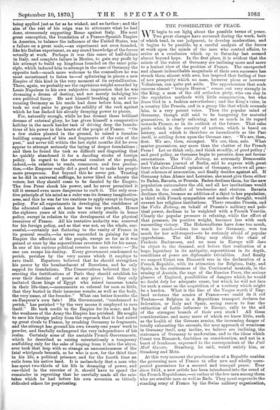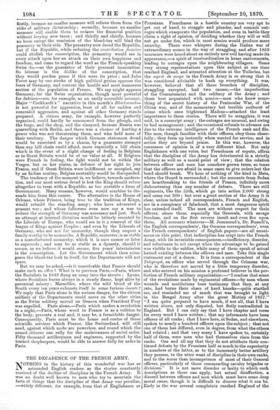THE POSSIBILITIES OF PEACE.
WE begin to see light about the possible terms of peace. Two great changes have occurred during the week, both of which tend, in our judgment, to develop moderation, and it begins to be possible, by a careful analysis of the forces at work upon the minds of the men who control affairs, to arrive at a conclusion which up to Saturday last seemed almost beyond hope. In the first place, it is evident that the minds of the rulers of Germany are inclining more and more to a lenient view of the position of France. The unexpected and almost indescribable magnitude of their own successes has struck them almost with awe, has inspired that feeling of fear of new prosperity which no man, however pious or however Voltairean, can quite put aside. The apprehension that such success almost " tempts Heaven " comes out very strongly in the King, a man of the old orthodox piety, who can slay in the regulation methods with little compunction, but who fears God in a fashion nevertheless ; and the King's voice, in a country like Prussia, and in a group like that which counsels him, is a very potent voice. Then the popular mind of Germany, though still said to be hungering for material guarantees, is clearly softening, not so much in its regard towards France, as in its outlook at the future. That calm pride which is the serenity of nations, which is based on history, and which is therefore as ineradicable as the Past itself, is settling down upon the German race. We are, then, first. We are, then, strongest. We are, then, safe. What matter guarantees, any more than the chatter of the French Press ? Let us think only, and think steadily, of good policy ;' and good policy, as Germans begin to perceive, does not favour annexations. The Yolks Zeitung, an extremely Democratic and Voltairean journal of Berlin, said to express with great force the ultra-Liberal opinion of Germany, reviews all prac- tical schemes of annexation, and finally decides against all. If Germany takes Alsace and Lorraine, she must give them either to Baden, Bavaria, or Prussia. Baden declines them, for the new population outnumbers the old, and all her institutions would perish in the conflict of tendencies and electors. Bavaria declines them, because an addition of a third to her population, a third with French sympathies and modes of thought, would overset her religious institutions. There remains Prussia, and the Yolks Zeitung, on behalf of Prussia's military and poli- tical power, declines to be weighted with a French Venetia. Clearly the popular pressure is relaxing, while the effect of that pressure, its positive weight, becomes less with each succeeding victory. The Hohenzollerns have done too much, won too much,—done too much for Germany, won too much for her self-respect--to be seriously afraid of popular opprobrium. The old King may claim the chair of Frederic Barbarossa, and no man in Europe will dare to object to the demand, and before that realization of a hope, legendary in its antiquity, superstitious in its depth, conditions of peace are diplomatic trivialities. And finally we suspect Count von Bismarck sees in the declaration of a French Republic, with its attraction for Belgium, Italy, and Spain, in the restlessness of the Continental neutrals, in the arming of Austria, the rage of the Russian Press, the serious glances of England, possibilities of dangers which he would no doubt defy for adequate cause, but which he will not face for such a cause as the acquisition of a territory which might be a burden. What is the line of the Vosges worth if Eng- land re-forms the armies of France—we could do it vic2 Toulon—or Belgium in a Republican transport declares for federation, or Italy and Spain, seeing reason to fear the extinction of Latin influence in Europe, rally to the aid of the strongest branch of their own stock ? All these considerations, and many more of which we know little, such as the health of the German armies, the increasing danger of totally exhausting the arsenals, the near approach of weariness in Germany itself, may incline, we believe are inclining, the statesmen of Germany to moderation, and to the ideas which Count von Bismarck, doubtless on consideration, and not in a burst of frankness, expressed to the correspondent of the Pall Mall Gazette. Strasburg, he said, would satisfy him, or Strasburg and Metz.
At this very moment the proclamation of a Republic enables the governing men of France to offer new and wholly unex- pected guarantees for a secured and tranquil peace. Ever since 1851, a new article has been introduced into the creed of the French Republicans,—or rather of the few men among them
who are sensible men as well as Reds. They must supersede the standing army of France by the Swiss military organization, firstly, because no smaller measure will relieve them from the risks of military dictatorship ; secondly, because no smaller measure will enable them to redress the financial position without levying new taxes ; and thirdly and chiefly, because no boon except the remission of the blood-tax will bind the peasantry to their side. The peasantry now dread the Republic, but if the Republic, while reducing the contribution fonciere could abolish the conscription, the peasantry would see in every attack upon her an attack on their own happiness and freedom, and come to regard the word as the French-speaking Swiss do,—as the guarantee of their personal immunities. So intense is the dislike of the conscription, that they would pardon peace if this were its price ; and Jules Fevre may by one stroke of high political genius appease the fears of Germany, and content the hostile and most numerous section of the population of France. We say might appease Germany, for the Swiss organization, though most powerful for defence—see, for example, as an easily accessible account, Major " Corkhardt's " narrative in this month's Black-wood- is not powerful for aggression, least of all for sudden and concealed aggression, and against all other Germany stands prepared. A citizen army, for example, however perfectly organized, could hardly be summoned from the plough, and the forge, and the shop, and the vineyard, because Russia was quarrelling with Berlin, and there was a chance of hurting a power who was not threatening them, and who held none of their territory. The danger which German statesmen dread would be exorcised as by a charm, by a guarantee stronger than any hill chain could afford, more especially a hill chain which in the event of a slight change of feeling in Belgium or in Great Britain would be of no value at all. If Belgium were French in feeling, the fight would not be within the Vosges, but on her plains, in defence of her right to join France, and if Great Britain were indifferent or occupied, say by an Indian mutiny, Belgian neutrality would be disregarded.
The tendency of the moment is, we believe, towards modera- tion, and our most serious dread is lest the King should refuse altogether to treat with a Republic, as too unstable a form of Government. Many reasons, however, would combine to dis- suade him from this course. The alternative is the House of Orleans, whose Princes, being true to the tradition of Kings, would rebuild the standing army ; who have advocated a peasant war ; and whose followers even now say a war to reduce the strength of Germany was necessary and just. Such an attempt at internal dictation would be bitterly resented by the Liberals of Europe, who would see in it a renewal of the league of Kings against Peoples ; and even by the Liberals of Germany, who are not for monarchy, though they respect a family worthy to be monarchs. A Republic, moreover, is as stable as a manufactured monarchy, which it is sure sooner or later to supersede ; and may be as stable as a dynasty, should it secure, as we believe it would secure, five years' intermission in the conscription. Let the Government which then reim- poses the blood-tax look to itself, for the Departments will not spare.
But we may be asked,—is it conceivable that France should make such an offer ? What is to garrison Paris,—Paris, where the Socialists in 1849 flung an army into the streets ; Lyons, where Socialism burns always in a steady flame, kept alive by perennial misery ; Marseilles, where the wild blood of the South every ten years exhausts itself in some furious ermeute We reply that Paris alone is the serious danger, for the citizen soldiery of the Departments could move on the other cities as the Swiss soldiery moved on Geneva when President Fazy was expelled. Paris alone,—Paris which makes a revolution in a night,—Paris, whose word to France is as a volition to the body, presents a real and, it may be, a formidable danger. Consequently, Paris must be the home and centre of those scientific services which France, like Switzerland, will still need, against which mobs are powerless, and round which the armed citizens can rally for the maintenance of social order. Fifty thousand artillerymen and engineers, supported by the trained shopkeepers, would be able to answer fully for order in Paris.































 Previous page
Previous page